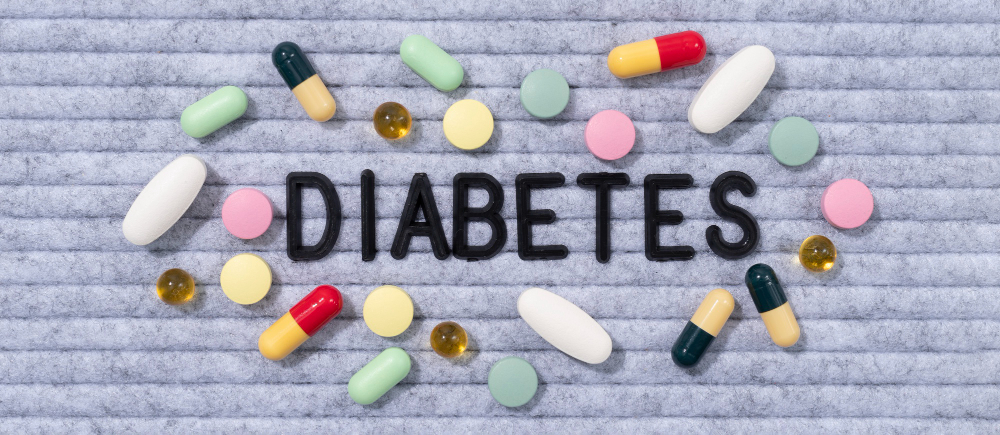Free Shipping
Free shipping on all orders

Diabetes care includes monitoring blood sugar, following a healthy diet, regular exercise, and taking medications to manage the condition.
Shop Now
Free Shipping
Free shipping on all orders
Free Shipping
Free shipping on all orders
Free Shipping
Free shipping on all orders
Free Shipping
Free shipping on all orders
About Diabetes Care

Diabetes care is essential for managing the condition and preventing complications. It involves regularly monitoring blood sugar levels, following a balanced diet rich in whole grains, lean proteins, and healthy fats, and engaging in regular physical activity. Medication or insulin therapy may also be required to help control blood sugar. Routine check-ups with healthcare providers are crucial for monitoring and addressing any diabetes-related complications. Additionally, education and support from healthcare professionals or support groups play a vital role in empowering individuals to manage their diabetes effectively. Stress management is also important, as stress can affect blood sugar levels. By taking a comprehensive and proactive approach, individuals with diabetes can maintain their health and well-being.
Products


Diabetes Care Natural & Ayurvedic Blood Sugar
Rs 500/- Rs 799/-

Diabetes Care Natural & Ayurvedic Blood Sugar
Rs 500/- Rs 799/-

Diabetes Care Natural & Ayurvedic Blood Sugar
Rs 500/- Rs 799/-

Diabetes Care Natural & Ayurvedic Blood Sugar
Rs 500/- Rs 799/-
30+ Years of Expertise

With years of expertise in diabetes care, our approach at Search Wellness is rooted in holistic principles and aligned with natural health practices. Our unique treatments focus on addressing the root causes of diabetes, providing comprehensive care rather than just managing symptoms, to promote long-term health and well-being.
Diabetes care involves
Blood Sugar Monitoring
Regular blood sugar monitoring is essential for managing diabetes. Patients use glucometers or continuous glucose monitors (CGMs) to track their glucose levels throughout the day.
Blood Sugar Monitoring
Regular blood sugar monitoring is essential for managing diabetes. Patients use glucometers or continuous glucose monitors (CGMs) to track their glucose levels throughout the day.
Blood Sugar Monitoring
Regular blood sugar monitoring is essential for managing diabetes. Patients use glucometers or continuous glucose monitors (CGMs) to track their glucose levels throughout the day.
Blood Sugar Monitoring
Regular blood sugar monitoring is essential for managing diabetes. Patients use glucometers or continuous glucose monitors (CGMs) to track their glucose levels throughout the day.
Blood Sugar Monitoring
Regular blood sugar monitoring is essential for managing diabetes. Patients use glucometers or continuous glucose monitors (CGMs) to track their glucose levels throughout the day.
Blood Sugar Monitoring
Regular blood sugar monitoring is essential for managing diabetes. Patients use glucometers or continuous glucose monitors (CGMs) to track their glucose levels throughout the day.

Blood Sugar Monitoring
Regular blood sugar monitoring is essential for managing diabetes. Patients use glucometers or continuous glucose monitors (CGMs) to track their glucose levels throughout the day.
Blood Sugar Monitoring
Regular blood sugar monitoring is essential for managing diabetes. Patients use glucometers or continuous glucose monitors (CGMs) to track their glucose levels throughout the day.
Blood Sugar Monitoring
Regular blood sugar monitoring is essential for managing diabetes. Patients use glucometers or continuous glucose monitors (CGMs) to track their glucose levels throughout the day.
Blood Sugar Monitoring
Regular blood sugar monitoring is essential for managing diabetes. Patients use glucometers or continuous glucose monitors (CGMs) to track their glucose levels throughout the day.
Blood Sugar Monitoring
Regular blood sugar monitoring is essential for managing diabetes. Patients use glucometers or continuous glucose monitors (CGMs) to track their glucose levels throughout the day.
Blood Sugar Monitoring
Regular blood sugar monitoring is essential for managing diabetes. Patients use glucometers or continuous glucose monitors (CGMs) to track their glucose levels throughout the day.
Blogs

29.Jun.2021
Richard Norton photorealistic rendering as real photos
Many years ago, I worked for my parents who own a video production company.
By: Peter Rowardson

29.Jun.2021
Richard Norton photorealistic rendering as real photos
Many years ago, I worked for my parents who own a video production company.
By: Peter Rowardson

29.Jun.2021
Richard Norton photorealistic rendering as real photos
Many years ago, I worked for my parents who own a video production company.
By: Peter Rowardson
Why Diabetes Care is Importent
Diabetes care is critically important because it serves as the foundation for managing a chronic condition that affects millions of people worldwide. Diabetes, particularly Type 2, has become increasingly prevalent due to factors like poor diet, sedentary lifestyles, and rising obesity rates. The proper care of diabetes extends beyond merely controlling blood sugar levels; it involves a comprehensive approach that includes dietary management, physical activity, medication adherence, regular monitoring, and psychological support. This holistic approach is vital because diabetes, if left uncontrolled, can lead to severe and life-threatening complications that not only diminish the quality of life but also significantly increase the risk of mortality.
One of the primary reasons why diabetes care is so crucial is the prevention of long-term complications. Diabetes, when unmanaged, can cause damage to various organs and systems in the body. Chronic high blood sugar levels can lead to cardiovascular diseases, including heart attacks and strokes, which are the leading causes of death among people with diabetes. Additionally, diabetes can cause damage to the small blood vessels in the kidneys, leading to nephropathy, which may result in kidney failure requiring dialysis or a transplant. The eyes are also at risk, with diabetic retinopathy being a leading cause of blindness in adults. Nerve damage, or neuropathy, is another serious complication, often resulting in pain, tingling, or loss of sensation in the extremities, which can lead to amputations in severe cases. These complications underscore the need for rigorous diabetes care, as they are often irreversible and significantly impact a person's life.

Moreover, the importance of diabetes care extends to improving the day-to-day well-being of individuals living with the disease. Managing diabetes effectively involves more than just medical interventions; it requires a lifestyle change that emphasizes a balanced diet, regular physical activity, and weight management. These lifestyle modifications not only help in controlling blood sugar levels but also improve overall health and energy levels, enabling individuals to lead active, fulfilling lives. Furthermore, diabetes management often includes the use of medications or insulin therapy, which must be carefully monitored and adjusted to ensure optimal blood sugar control. Regular check-ups with healthcare providers are essential for monitoring progress, adjusting treatment plans, and addressing any emerging health issues.
Diabetes care also has a significant psychological component. Living with a chronic disease can be mentally and emotionally challenging, leading to feelings of stress, anxiety, or depression. Comprehensive diabetes care includes psychological support to help individuals cope with the demands of managing the disease. Mental health support is crucial because it empowers individuals to stay motivated and adhere to their treatment plans, which is essential for long-term success in managing diabetes.
From a broader perspective, diabetes care is vital for reducing the burden on healthcare systems globally. The rising prevalence of diabetes poses a significant public health challenge, leading to increased healthcare costs due to hospitalizations, treatments, and management of complications. Effective diabetes care can alleviate this burden by preventing complications and reducing the need for costly medical interventions. Public health initiatives that promote diabetes education, early detection, and preventive care are essential for mitigating the impact of the disease on society as a whole.